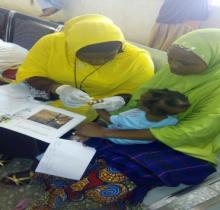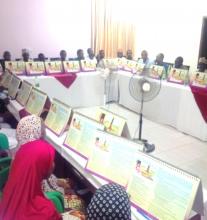Displaced persons: WHO empowers health workers on maternal and child survival techniques
Abuja, 25 April 2016 - Given the dire need for quality and sustainable health care in the IDP camps and hosting communities for children under five years, the Federal and State Ministries of Health, National Primary Healthcare Development Agency (SPHCDA) and partners including the World Health Organization (WHO) agreed to build capacity of community resource persons living in the IDPs camps and host communities, with the support from USAID/Nigeria grant.
The first phase of series of planned capacity building activities for community resource persons (CORPs) was conducted from 05 to 17 April. During the two weeks training, 14 supervisors and 100 CORPs were trained on both Integrated Management of Childhood Illness (IMCI) and Integrated Community Case Management (iCCM). The Supervisors selected are CHEWS who work at Primary Health Care Facilities while the CORPS were selected and recruited from 15 IDP camps and 46 host- communities in Adamawa, Borno and Yobe.
It is on record that more than 2.1 million people, particularly women and children were internally displaced due to the insurgency that ravaged most part of the north eastern zone of Nigeria, mainly in Adamawa, Borno and Yobe States. The internally displaced persons (IDPs) were placed in camps or blended in host communities in the three most affected states.
Since the onset of the insurgency in the north east, the challenge for humanitarian agencies remains how to provide quality health care both curative and preventive to many under five children closest to where they live or placed, be it IDPs camps or host communities. Presently, WHO supports two key child survival strategies of IMCI and iCCM in the affected states, targeting children the age of five.
After the training, the CORPs were provided with medicines and supplies for treating pneumonia (Amoxicillin), diarrhea (Low Osmolar ORS and Zinc) and rapid diagnostic test (RDT) for identifying those with malaria and artemisinin combination therapy (ACT) for treating those with malaria. They were also given mid upper arm circumference (MUAC) stripes for identifying different degrees of malnutrition. The participants were also taught when to refer and how to identify a sick young infant (less than 2months) immediately. The 100 CORPs were also trained to promote 19 family and community practices.
It could be recalled that in 2012, Nigeria adopted 19 family and community key practices for IMCI and iCCM. The IMCI objective is to contribute to the reduction of under-five mortality rates. On the other hand, iCCM is a new strategy for trained, equipped and supervised community health workers to assess and deliver treatment to children under-five years who have signs of fast breath/pneumonia, diarrhea and fever/malaria.
The IMCI strategy has three components: Case Management, improve health systems and promotion of key family and community practices also known as community IMCI (Preventive). The treatment in case of iCCM is delivered at households in hard to reach communities while the treatment in case of the iMCI strategy is delivered at Primary Healthcare Centres.
Presently, the CORPs are treating sick children and providing messages to prevent the common childhood illnesses and other vices that affect child survival in 15 IDP camps and 46 host communities. The trained supervisors are also expected to visit the CORPs on monthly basis for supportive supervision.
__________________________________________________
For more information, please contact:
Dr Andrew Mbewe:; Tel: +234 703 170 5252; Email: mbewea [at] who.int
Dr Joy Ufere; Tel: +234 807 759 0006; Email: uferej [at] who.int
__________________________________________________
Below:
01 Training on promotion of key MNCH household and community practices
02 Trained CORP assessing a sick child





